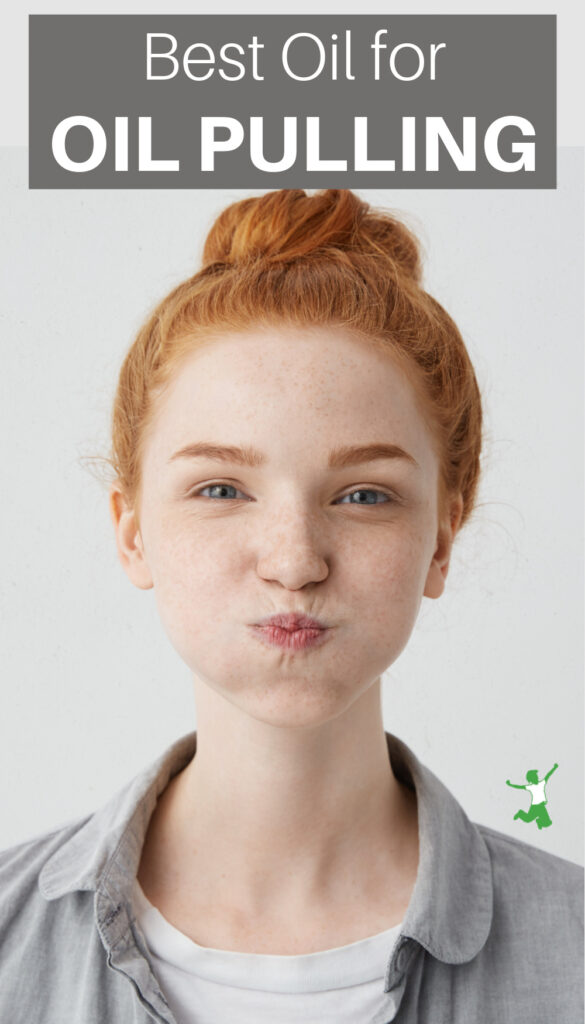The best oils to use for oil pulling for optimal benefits to oral health by eliminating toxins and pathogens from the gateway microbiome.

I first learned about oil pulling two decades ago while studying Ayurvedic cooking.
“Pulling” is an ancient detoxification therapy mentioned in ancient Ayurvedic texts and is recommended as an easy, daily practice.
Over time, “oil gargling” or “swishing” can drastically improve oral health and help resolve many chronic conditions such as periodontal (gum) disease and cavities. (1)
It can also be helpful for acute illness.
For example, oil pulling therapy has been touted as a strep throat remedy and helps resolve persistent sore throat issues.
Oil Pulling Health Benefits
The modern resurgence of this ancestral practice started in 1992 and was initiated by Dr. F. Karach, MD, who used it with great success in his medical practice.
Dr. Karach claimed that oil pulling would resolve a variety of illnesses including hormonal problems, cardiovascular disease, and digestive ailments. (2)
Dr. Bruce Fife, author of Coconut Cures and Oil Pulling Therapy: Detoxifying and Healing the Body Through Oral Cleansing, suggests that oil pulling therapy can effectively be used to clear and heal sinus problems. (3)
In fact, this is one of the first detox symptoms that are experienced is an increased flow/clearing of mucus from the throat and sinuses.
Mucous drainage is one of the body’s best methods of removing toxins.
How Does “Pulling” Work?
The practice of oil pulling is extremely simple.
Simply swish one tablespoon of raw, cold-pressed oil in the mouth for 15-20 minutes.
The swishing process involves gently pushing and pulling the oil around and through the teeth.
Try to oil pull at least once and up to three times per day on an empty stomach.
If you only do it once per day, the best time is first thing in the morning before breakfast or drinking anything. However, if you forget, any time of day before eating will do if necessary.
Dr. Fife advises the following while oil pulling:
While you are pulling, mucous may build in the back of your throat. You may even have to expel the oil and clear the mucous from your throat before reaching a full 20 minutes. That’s okay, take another spoonful of oil and continue until you’ve pulled for a total of 15-20 minutes. (4)
After swishing with the oil for the allotted amount of time, the oil is completely spat out and the teeth, gums, tongue, and palate are gently cleaned by rinsing the mouth with saltwater and brushing as usual.
Feel free to use a bit of sole water for this purpose if you have some on hand.
This next point may seem obvious, but it bears mentioning. It is important to never swallow or otherwise reuse the oil.
I think it is best to spit it out into the toilet rather than the sink because it contains toxins and bacteria and possibly even pus and mucous if an infection is present.
Which Oil is Best?
A variety of oils work very well for oil pulling.
Traditionally, unrefined sesame oil, coconut oil, or butter oil (ghee) were used.
The modern-day practice of this ancient therapy includes extra virgin olive oil or unrefined sunflower oil as alternatives as well.
While any one of these oils is likely effective, is any particular choice better than the others?
According to research performed by Irish scientists from the Athlone Institute of Technology who tested the effects of coconut oil, vegetable oil, and olive oil on dental health, the answer is yes.
Of the three types of oil tested, only coconut oil prevented tooth enamel damage by the pathogen Streptococcus mutans.
This acid-producing bacterium is a common inhabitant of the mouth and a major cause of tooth decay. (5)
This latest finding lends serious credibility to anecdotal claims that oil pulling works best with coconut oil.
Lead researcher Dr. Damien Brady stated that coconut oil could prove to be an attractive alternative to chemicals in maintaining oral health. (6)
He noted that not only does coconut oil work at relatively low concentrations but with the worrisome problem of increasing antibiotic resistance, it is important to consider coconut oil as a potentially novel new way to control microbial infections.
Dr. Fife also recommends making medicated coconut oil to enhance the effects and healing properties of oil pulling. (7)
Refined vs Unrefined
Virgin coconut oil (VCO) is the best choice for oil pulling therapy as it is truly “raw”.
This type of coconut oil is completely unheated with micronutrients and co-factors not present in refined versions. It is ideal for medicinal use.
Remember too, that coconut oil solidifies at 76 °F/24 °C, so if your virgin coconut oil is solid in the pantry, you may need to gently liquefy it in a pan of warm water first.
However, this step is not necessary if you are comfortable letting it melt in your mouth before you start swishing.
If you wish to supercharge the process, you can use ozonated coconut oil, which further enhances the anti-bacterial and anti-plaque benefits of oil pulling.
This therapeutic form of coconut oil is great for holistic dental flossing too and a practice recommended by biological dentists.
Bonus! Virgin coconut oil is an excellent oral antifungal as well.
Is Oil Pulling Right for You?
Oil pulling is probably the cheapest and easiest oral detoxification regimen you could ever try.
It simply involves swishing your mouth with unrefined oil one to three times a day on an empty stomach and then spitting it out.
No dieting, fasting, herbs, or pills are required to get started.
No matter what your age or level of health, oil pulling is harmless and nearly anyone can do it.
Sometimes powerful answers come in a brown paper bag.
Give oil pulling with virgin coconut oil a try!

(1) A review of holistic approaches to oral health
(2) Oil Pulling Therapy by Dr. Karach: Russian Folk Remedy
(3, 4, 7) Oil Pulling Therapy: Detoxifying and Healing the Body Through Oral Cleansing
(5, 6) Coconut oil can combat tooth decay, study suggests








Hi!
I’ve recently also heard about oil pulling with castor oil! Any thoughts??
It’s not a traditionally used oil for this purpose from what I’ve seen in the Ayurvedic texts. Will have to look more into that.
Castor oil does not have the antimicrobial properties of coconut oil, however.
I have been doing it almost daily with sesame oil for such a long time. My mouth just feels so much better after oil pulling. It feels refreshed.
I would suggest spitting the coconut oil into the trash rather than the toilet. It can solidify and cause blockages in the toilet and plumbing.
I recently heard castor oil was superior to VCO for oil pulling. Do you have any thoughts on this?
Castor oil would not have the same antimicrobial properties as VCO. I also have not seen any studies of the impact of castor oil on oral health like there are for coconut oil. If you know of any, please post the link(s).
Is it possible that after oil pulling for several months, I am more sensitive to smells? My sinuses are so clear from doing this daily that I am very sensitive to the smells from other people now, including their breath. Has anyone else experienced this?
INTERESTING!!! Can the same coconut oil that is used for cooking be used?
Yes indeed.
How about Titanium implants In my mouth? Some of them are old and gums went down so metal is open in my mouth. Can I do oil pulling?
Titanium implants should be ok for oil pulling. Titanium implants are problematic for other reasons though unfortunately. https://www.thehealthyhomeeconomist.com/dental-implants/
Is it’s better to get a VCO in a glass container as compare to plastic?
Glass is best, yes.
Thank you for your help. I’ve had the coconut cures book for years but never found the link to oil pulling until now! I’m absolutely astonished with this information and it came for me at a crucial health time in my life. Thank again!
Oil pulling has worked wonders for me, is the liquid coconut oil (doesn’t solidify) as effective as the regular oil?
Liquid coconut oil also called MCT oil has had most/all of the lauric acid removed which is the most important fatty acid. I would not recommend using it for oil pulling. Here’s more information on it. https://www.thehealthyhomeeconomist.com/mct-oil-the-coconut-oil-dregs/